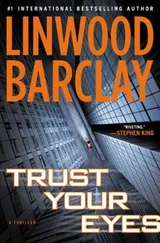She glanced past him at the papers spread out on the dining table, raised an eyebrow.
“Bunch of stuff from Jack Hardwick,” he said, too casually. “He asked me to look it over.” He imagined her level gaze examining his thoughts. He added, “It’s stuff from the Jillian Perry case file.” He paused. “I’m not sure exactly what I’m supposed to do, or why anyone thinks my observations would be helpful under the existing circumstances, but… I’ll take a look at what’s here and give him my reactions.”
“And her?”
“Her?”
“Val Perry. Will you be giving her your reactions, too?” Madeleine’s voice had taken on a light, airy quality that communicated rather than concealed her concern.
Gurney stared down into the fruit bowl on the granite top of the sink island, resting his hands on the cold surface. Several fruit flies, disturbed by his presence, rose from a bunch of bananas, flew in asymmetric zigzags above the bowl, then settled again on the fruit, becoming invisible against the speckled skin.
He tried to speak softly, but the effect was condescending. “I think you’re disturbed by the assumptions you’re making, not by what’s actually happening.”
“You mean my assumption that you’ve already decided to jump on the roller coaster?”
“Maddie, how many times do I have to say it? I haven’t made any commitment to anyone to do anything. I’ve made absolutely no decision to get involved in any way beyond reading the case file.”
She gave him a look he couldn’t quite understand, a look that went into him-a look that was knowing and gentle and strangely sad.
She began placing the tops back on the glass storage containers. He watched her without comment until she started putting the containers back into the refrigerator.
“Aren’t you going to eat anything?” he asked.
“I’m not that hungry right now. I think I’ll take a shower. If it wakes me up, then I’ll eat. If it makes me drowsy, I’ll go to bed early.” As she passed the table with its burden of paperwork, she said, “Before our guests arrive tomorrow, you’ll put all that away where we won’t have to look at it, right?” She left the room, and half a minute later he heard the bathroom door closing.
Guests? Tomorrow? Christ!
A dim recollection, something Madeleine had mentioned to him about someone coming for dinner-the shadow of a memory, stored in an inaccessible storage bin, a bin containing objects of little importance.
What the hell is going on with you? Isn’t there any room left in your head for ordinary life? For a simple life, shared in good and simple ways, with ordinary people? Or maybe there was never any room for that. Maybe you always were the way you are right now. Maybe life here on a secluded mountaintop-cut loose from the demands of the job, deprived of convenient excuses for never being present in the lives of people you claim to love-is making the truth harder to hide. Could the simple truth be that you don’t really care about anybody?
He walked around to the far side of the sink island and switched on the coffeemaker. Like Madeleine, he’d lost his appetite for dinner. But the idea of coffee was appealing. It was going to be a long night.
Peculiar facts
It made sense to begin at the beginning by examining the identikit portrait of Hector Flores.
Gurney had mixed feelings about computer-generated facial composites. Constructed from the input of eyewitnesses, they mirrored the strengths and weaknesses of all eyewitness testimony.
In the case of Hector Flores, however, there was good reason to trust the likeness. The descriptive details had been provided by a man with the observational skills of a psychiatrist and who was said to have been in daily contact with the subject for nearly three years. A computer rendering with input of that quality could rival a good photograph.
The image was of a man, probably in his mid-thirties, good-looking in an unremarkable way. The facial bone structure was regular, with no feature predominating. The skin was relatively free of lines, the eyes dark and emotionless. The hair was black, fairly neat, casually parted. There was only one distinguishing mark Gurney could discern, oddly shocking in the midst of such an otherwise ordinary appearance: The man’s right earlobe was missing.
Appended to the composite portrait was the inventory of physical statistics. (Again Gurney’s assumption was that these would have been provided primarily by Ashton and would therefore have a high likelihood of accuracy.) Hector Flores’s height was listed as five feet nine inches; weight 140-150; race/nationality Hispanic; eyes dark brown; hair black, straight; complexion tan, clear; teeth uneven, with one gold incisor, upper left. In the “Scars and Other Identifying Marks” section, there were two entries: the missing earlobe and severe scarring on the right knee.
Gurney looked again at the picture, searched for some spark of madness, a glimpse of the mind of the ice man who beheaded a woman, used the head to deflect the body’s spurting blood away from himself, then placed her head on the table, facing the body from which it came. In the eyes of some killers-Charlie Manson, for instance-there was a demonic intensity, urgent and unconcealed, but most of the murderers Gurney had brought to justice during his career as a homicide detective were driven by a less obvious madness. Hector Flores’s bland, uncommunicative face-in which Gurney could see no hint of the hideous violence of the crime itself-put him in this category.
Stapled to the physical-statistics form was a typed page with the heading “Supplementary Statement Provided by Dr. Scott Ashton on May 11, 2009.” It was signed by Ashton and witnessed by Hardwick, as chief investigating officer. The statement was brief, considering the time period and events it covered.
My first meeting with Hector Flores was in late April of 2006, when he came to my home as a day laborer looking for employment. Starting then, I began giving him work around the yard-mowing, raking, mulching, fertilizing, etc. He spoke almost no English at first but learned quickly, impressing me with his energy and intelligence. In the following weeks, seeing that he was a skilled carpenter, I came to rely on him for a broad range of outdoor and indoor maintenance and repair projects. By mid-July he was working in and around the house seven days a week-adding routine housecleaning to his list of chores. He was becoming the perfect domestic employee, showing great initiative and common sense. In late August he asked if, in lieu of some of the money I was paying him, he might be allowed to occupy the small unfurnished cottage behind the house on the days he was here. With some misgivings I agreed, and shortly thereafter he began living in it, approximately four days a week. He got himself a small table and two chairs at a thrift store, and later aninexpensive computer. He said that was all he wanted. He slept in a sleeping bag, insisted that was the way he was most comfortable. As time passed, he began exploring various educational opportunities on the Internet. Meanwhile his appetite for work only seemed to grow, and he began evolving into a kind of personal assistant. By the end of the year, I was trusting him with reasonable amounts of cash, and he was handling occasional grocery shopping and other errands with great efficiency. His English had become grammatically flawless, although it was still heavily accented, and his manner was charming. He frequently answered my phone, took cogent messages, even provided me with subtle shadings of information about the tone or mood of certain callers. (In retrospect this seems bizarre-that I would be relying in this way on a man who had not long before been looking for a job spreading mulch-but the arrangement worked well, without a single problem I was aware of, for almost two years.) Things began to change in the fall of 2008, when Jillian Perry came into my life. Flores soon became moody and reclusive, always finding reasons to be away from the house when Jillian was present. The changes became more disturbing in early 2009, when we announced our wedding plans. He disappeared for several days. When he returned, he claimed to have discovered terrible things about Jillian and that I would be risking my life by marrying her, but he refused to provide details. He said that he couldn’t tell me anything more without revealing the source of his information, which he couldn’t do. He begged me to reconsider my decision to marry. When it became clear that I was not going to reconsider anything without knowing exactly what he was talking about, and that I would not tolerate unsupported accusations, he seemed to accept the situation, although he continued to avoid Jillian. In retrospect, of course, I should have fired him at these indications of his instability, but with the arrogance of my profession, I assumed that I would be able to discover the nature of the problem and solve it. I saw myself conducting a grand experiment in education, never fully accepting the fact that I was dealing with a dangerously complex personality and that everything might spin out of control. I must also admit that he had made mylife easier and more convenient in so many ways that I was reluctant to let him go. I cannot overemphasize the degree to which his intelligence, rapid self-education, and range of talents had impressed me-all of which now sounds delusional in the light of what has happened. My final encounter with Hector Flores occurred the morning of the wedding. Jillian, who was well aware that Hector despised her, was obsessed with getting him to accept the reality of our marriage, and she prevailed upon me to make one last effort to persuade him to attend the ceremony. I went to the cottage that morning, found him sitting like a block of stone at the table. I went through the motions of extending one more invitation, which he refused. He was dressed entirely in black-black T-shirt, black jeans, black belt, black shoes. Perhaps that should have meant something to me. That was the last I saw of him .
Читать дальше












